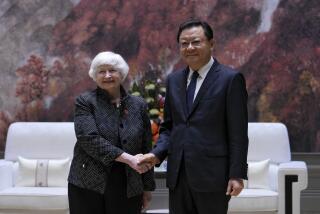China, in dramatic shift, signals interest in U.S.-led trade talks
WASHINGTON -- Since the U.S. and other nations began talks on an Asia-Pacific free-trade pact, Chinese officials had pretty much looked at the deal with suspicion, as another attempt to contain China’s rise in the world.
Now, however, Beijing is giving a wholly different signal: a willingness to join the U.S.-led negotiations.
“We will analyze the advantages, disadvantages and the possibility of joining the TPP,” said Ministry of Commerce spokesman Shen Danyang, referring to the Trans-Pacific Partnership, at a briefing Thursday.
The TPP talks already involve 11 countries, including Australia, Vietnam, Canada and Mexico. And with Japan soon to join, those at the negotiating table would represent close to two-fifths of the world economy.
The Obama administration sees the TPP as more than an agreement that would remove tariffs in the fast-growing Pacific region. It is meant also to set standards and address critical regionwide issues on regulations, supply chains and state-owned enterprises. All of which would presumably help Obama’s broader goal of boosting American exports as well as strengthening Washington’s influence in the Asia-Pacific region.
Trade analysts doubt that that, given China’s current economic structure, Beijing could realistically join such an ambitious multilateral trade deal -- and one led by the U.S.
“In the long term, it’s vital for China to become part of a pan-Pacific trade pact along the lines of the TPP,” said Edward Gerwin Jr., senior fellow for trade policy at Third Way, a centrist Democratic think tank. “The studies show that China and the United States would both be the biggest winners from the negotiation of such a high-standard and comprehensive trade deal. But the long-term for China may mean 2020.”
Still, the latest comments from Beijing signal a dramatic shift in the way the Chinese are looking at the TPP. Once highly critical and perhaps a bit defensive about the ongoing TPP talks, which figure to extend well into next year, Chinese officials increasingly are asking about the details of the pact and what it might mean for China’s trade and regional economic relationships.
“I think there’s been a sea change in attitude,” said Nicholas Lardy, an authority on the Chinese economy at the Peterson Institute for International Economics.
ALSO:
Restraint is the new red in China
U.S., Japan lay out plan for trade talks
At U.S.-Japan summit, China’s presence will be felt







